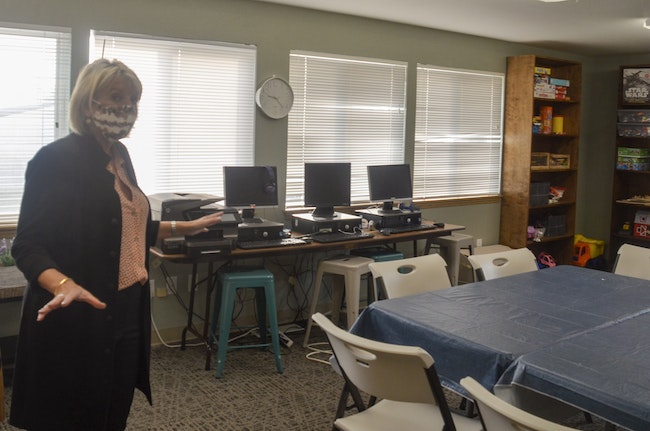
Kim Lemman, executive director of St. Francis Shelter, speaks in the shelter’s library room, where families got online before the Covid pandemic (Rachel Alexander/Salem Reporter)
In late 2019, staff at St. Francis Shelter had just finished renovating their library – a space for the 20 formerly homeless Salem families who live at the apartment complex to gather, use shared computers and find toys and books for their kids.
A few months later, the pandemic hit.
Suddenly, dozens of kids needed high-speed Internet access to attend school. Parents in recovery from alcohol and drug addiction had to attend group meetings online. Doctor’s appointments and court hearings went virtual too.
The shelter, built in 1963, had three desktop computers with no webcams in one room where residents could no longer gather. The building wasn’t wired for Wi-Fi, so even if families had the money to pay for Internet service, there wasn’t an easy way to get hooked up. Some got a Wi-Fi hotspot through the Salem-Keizer School District, but those ran out.
“Access was very, very fragmented,” said Jill Tucker, the shelter’s development director.
Wiring the building for Wi-Fi access would cost about $20,000. Kim Lemman, the executive director, said they normally spend about $40,000 per year on capital improvements, like renovating apartments as families move out. Adding Internet infrastructure wasn’t in the budget.
“We were paralyzed for a second,” Lemman said.
But the Salem Health Foundation stepped up to help.
The foundation is a separate nonprofit organization from Salem Health, and grants money to support health care in the area, with about $1.6 million given out in the past year. Most of that went to Salem Hospital for items like ventilators and protective equipment, but the foundation also gives money to community health efforts, including mobile testing clinics for Covid.
St. Francis provides transitional housing, individual apartments where families live for about six months as case workers help them find a more permanent home.
Lemman said about one-third are domestic violence survivors referred through Salem’s Center for Hope and Safety, and one-third are referred through a Marion County court program that helps parents with drug addictions and open child welfare cases get treatment and support.
That means many residents have regular appointments with therapists, addiction counselors and other health care providers.
Alex Casebeer, the foundation’s board chair, said they’ve never given money for IT infrastructure before. But the foundation board saw St. Francis’ need as a health issue. Suddenly, families couldn’t go to the doctor or stay on track in addiction recovery without Internet access. And they worried about kids’ mental health without access to school.
“That was an easy yes for the foundation,” Casebeer said. They awarded the money over the summer after Lemman applied for a grant.
With a $20,000 grant, Tucker got a CenturyLink technician and electrician to work together, wiring the apartment complex and installing multiple routers. They finished the work Sept. 1, just ahead of the new school year.
Now, families have their own secure high-speed network, which Tucker said is fast enough to accommodate all the shelter’s school-aged kids in classes at the same time.
“They love that their kids are able to do school work,” said Mackenzie Kohler, the family case manager. The upgrade has made staff work easier too – Kohler was attending a virtual court session Wednesday morning.
Tucker said Internet access is a utility like electricity or water, increasingly essential for all families to participate in modern life. But it took a pandemic to make the upgrade their families needed.
“It’s a game-changer. In the digital age, we can now provide equitable digital access for all our families,” Tucker said.
SUPPORT ESSENTIAL REPORTING FOR SALEM – A subscription starts at $5 a month for around-the-clock access to stories and email alerts sent directly to you. Your support matters. Go HERE.
Contact reporter Rachel Alexander: [email protected] or 503-575-1241.

Rachel Alexander is Salem Reporter’s managing editor. She joined Salem Reporter when it was founded in 2018 and covers city news, education, nonprofits and a little bit of everything else. She’s been a journalist in Oregon and Washington for a decade. Outside of work, she’s a skater and board member with Salem’s Cherry City Roller Derby and can often be found with her nose buried in a book.









